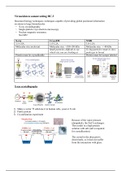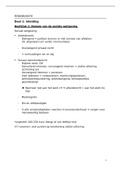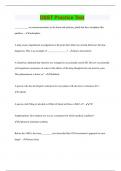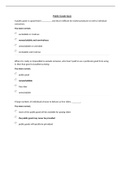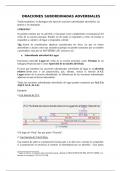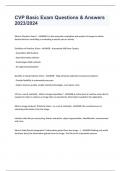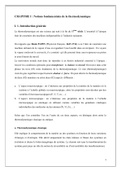QUESTIONS AND 100% CORRECT
VERIFIED ANSWERS /GRADE A
m No defendant can be convicted without? - Evidence
Officers two important roles concerning evidence? - Find evidence with or without a warrant; helps the
prosecutor get the evidence admitted at trial.
The main duty of persecutors is? - To make sure justice is done.
Brady VS Maryland - the prosecution is required to disclose all evidence to the accused
Even though an officer may obtain evidence properly under 4th amendment it may not be admissible
under Texas Constitution. - EX. Richardson VS. State. In federal law no right to privacy on numbers dialed
on a phone, but in Texas citizens have a right to privacy regarding numbers dialed on a phone.
Reasonable search - 1) Supported by probable cause. 2) search made with warrant or exception to
warrant requirement.
Probable Cause - Enough facts to show evidence of a crime will be found
Exceptions to search warrant requirements. - 1) Incident to lawful arrest. 2) Terry search 3)
Administrative search 4) Consent 5)Border, airport, or roadblock 6) Inventory 7) Automobile 8)
Emergency
Search defined - Intrusion into an area covered by reasonable expectation of privacy.
,Areas of reasonable expectation of privacy. - 1) House and curtilage 2) Car, van, motor home, or
recreation vehicle 3) Persons body including blood 4) Purse, wallet, and suitcase 5) Backpack 6) Hotel
room 7) Telephone booth 8) Desk and private office 9) Private dressing room in club 10) Bathroom stall
11) Box or envelope 12) Diary or personal letter 13) Numbers dialed from a phone
No expectation of privacy. - 1) Garbage placed on curb for collection 2) Photo of persons wound or injury
3) Persons facial appearance 4) Public waiting room at doctors office 5) Dressing room at store if
customer informed room under surveillance for shoplifting 6) Hotel room where manager calls to vacate
person who's not paid or time is expired 7) Public street, building or area which public given access 8)
common area where public may go 9) Automotive VIN 10) Bank account info voluntarily given to a bank
11) Monitoring beeper used to follow transport of drugs 12) Allowing drug detection K9 to sniff piece of
luggage in public place 13) VIN located on vehicle dash or door jamb 14) Prison cell
Plain View Doctrine - 4th Amendment does not cover something when its in plain view
Plain Touch Doctrine - During a proper pat down for weapons if officer detects something that is
immediately apparent to be drugs or weapons, the officer may seize without a warrant.
Public Scent - When a drug dog detects contraband in a public place it is not a search.
K9 Sniff - Sniff around exterior of car in a public place during a valid traffic stop = no violation of 4th
Amendment
Abandonment - If person voluntarily abandons property, officer may retrieve it and no search occurred.
Excludes when officer attempts to stop person for no reason, person throws drugs and runs away.
Standing - Persons right to complain about an improper search at trail.
Warrant Contents - 1) labeled in the name of "The State of Texas" 2) Statement describing the evidence
to be taken and person, place, or thing to be searched 3) Must command a peace officer 4) Must be
signed by a judge
Warrant issued to photograph an injured child. - 1) Must name or describe the child to be photographed
2) Film is delivered to judge 3) Must be executed by an officer that is the same sex as the child; If the
,officer is not he same sex as the child they must be assisted by someone who is the same sex as the
child/victim.
Warrant for Fire Marshal and Health officers (Determine hazards or violations) - Must have PC. 1) Age
and condition of place 2) Previous Violations 3) Type of place to be searched 4) Purpose of which place
used 5) Presence of violations or hazards
Court order for interception of wire or oral communications - PC to show that provide evidence of a
FELONY other that felony possession of marijuana, or a FELONY under the TEXAS Dangerous Drug Act.
Tap not authorized for other offenses.
Things for Which a Search Warrant May be Issued - 1) property acquired by theft or other criminal ways;
2) property specifically designed, made, or adapted for or commonly used in the commission of a crime;
3) arms & ammo kept or prepared for insurrection or riot; 4) weapon prohibited by PC; 5) gambling
devise, equipment, or paraphernalia; 6) obscene material for commercial distribution/exhibition; 7)
drug, controlled substance, immediate or chemical precursor, other CS properties, including
paraphernalia; 8) possession of property prohibited by law; 9) implement or instrument used in
commission of crime; 10) property or items, except personal writings of accused, constituting evidence
of a crime or evidence tending to show a particular person committed crime; 11) a person; 12)
contraband subject to forfeiture under CH.59 CCP.
Evidentiary Search Warrants - Example: Officer knows murder was committed & victim beaten w/ bat or
stick. Officer wants to get search warrant for suspect home to look for evidence, such as bloody clothes
or victims property. Possession of bloody clothes, sticks, or bats is not illegal, but would help to show
suspect committed crime. The officer would need to get evidentiary search warrant.
Special Probable Cause Requirements for Evidentiary Search Warrant - 1) specific offense has been
committed, 2) evidence wanted is of the crime, or evidence showing person committed the crime, 3)
evidence wanted is located where wanting to search.
Arrest Warrant Validity - An arrest warrant is valid anywhere in Texas, this is not true for a search
warrant. The magistrate signing the search warrant must have geographic authority over area to be
searched.
Gates v. Illinois - Is the most important case on PC. Anonymous letter sent to police about drug dealers.
, Who Decides Whether Probable Cause Exists - 1) the officer 2) the magistrate 3) the trial judge 4)
appellant judge
Anonymous Informer - Most courts have held that generally, info given by anonymous informer will
never, standing alone, be sufficient to establish PC. If officer wants to use info from unidentified source,
officer may establish credibility by corroborating some of the info given. (Example: call in of red car in
mall parking lot selling drugs, officer does surveillance & confirms.) Officer corroborated.
Burden of Proof on Probable Cause - Although PC is sometimes hard to provide, an officer can be sure of
one thing: PC is not proof beyond a reasonable doubt, not even a preponderance of evidence is needed.
PC only requires a "fair probability" of what the officer wants will be located where the officer wants to
search, or for an arrest warrant that the person committed the crime. Proof beyond a reasonable doubt
is not required. This means less than a 50/50 probability is required.
Four Corners Rule - Issuing Authority's review of probable cause must be based solely on facts contained
in the written application
Nexus - (a connection or link) officer must put enough facts in affidavit to show evidence will be in place
sought to be searched. This is called a "nexus" between the place and the evidence. Example: You find
drugs in car on routine traffic stop. You want search warrant for suspects home. You have to connect
illegal activity to the home in the affidavit to have PC to search home. If you cant, no "nexus" between
illegal items in car to house. Link between evidence & place to search.
Search warrant allowed days to execute - w/in 5 days of issuance
DNA warrant allowed days to execute - DNA specimen is sought, in which case 17 days are given
"Knock and Announce" Requirement - Before an officer goes inside a house to execute a warrant, the
officer must "knock & announce" his presence, to let any person inside house know officers presence
outside and intentions to enter on authority of the warrant. This rule dates back to England in the
1600's. Used for officer safety.
Exceptions to "Knock and Announce" Requirement - Officers must have reasonable suspicion that 1)
poses a danger to officers, or 2) would affect the investigation of the crime (suspect destroying



